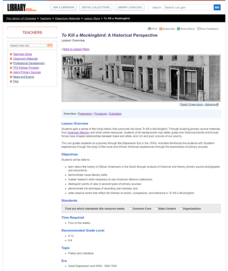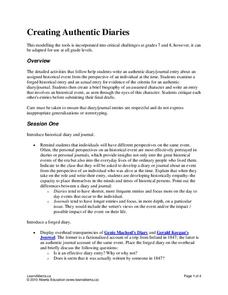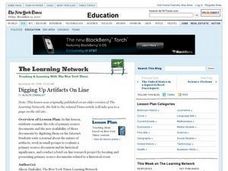Maryland Department of Education
The Concept of Diversity in World Literature Lesson 9: Debating Imperialism
To gain an understanding of Imperialism, class members read Rudyard Kipling's poem, "The White Man's Burden" and Mark Twain's essay, "To the Person Sitting in Darkness." Groups compare these perceptions of non-white cultures with the...
Library of Congress
To Kill A Mockingbird: A Historical Perspective
Students study the novel, To Kill a Mockingbird. Through studying primary source materials from American Memory and other online resources, students of all backgrounds study the relationships between blacks and whites.
English Enhanced Scope and Sequence
Research Project Embedded with Media Literacy
Here is a phenomenal language arts lesson on media literacy for your middle and high schoolers. In it, learners produce a research product in the form of a public service announcement (PSA). First, they view examples of these PSA's to...
Smithsonian Institution
The Birth of an Icon: Learning and Performing the Origins of the Drum Set and Early Jazz Drumming in New Orleans, Louisiana
Bass drum, snare drum, tom-toms, cymbals. Perched behind their drum sets, wielding their drum sticks and wire brushes, drummers lay the grove and are the heartbeat of a band's performance. A dynamic lesson introduces young musicians to...
Curated OER
Mondrian - Primary/Secondary Color Study
Utilizing computer software, learners demonstrate the color spectrum. They investigate the life of the artist Piet Mondrian and define his style of artwork. Then they use Photoshop to recreate some of his designs while discovering the...
Curated OER
Rhetorical Devices in a Primary Source
Analyze Martin Luther King Jr.'s famous and powerful "I Have a Dream" speech as a primary source document. After reading up on rhetorical devices and working in small groups to define terms, class members identify and explain the use of...
Curated OER
Teaching With Documents Lesson Plan: "A Date Which Will Live in Infamy"
Your class examines F.D.R.'s speech for examples of repetition, alliteration, emotionally charged words, etc. They listen to the speech and interview a person who heard it delivered. They finish by writing an article about the experience.
Curated OER
Lesson: Mary Heilmann: To Be Someone
Kids consider the pure abstraction and minimalism found in Mary Heilmann's work. They analyze several of her pieces through critical discussion and then think about her use of a song title as the title of her exhibit. Learners then use a...
Curated OER
Jazz in America Lesson Plan 2
Young scholars explore jazz's primary elements. They identify the basic definitions of terms associated with jazz. In addition, they listen to Song for My Father.
Ford's Theatre
How Perspective Shapes Understanding of History
The Boston Massacre may be an iconic event in American history, but perhaps the British soldiers had another point of view. Using primary sources, including reports from Boston newspapers and secondary sources from the British...
University of Chicago
Using Artifacts for Clues About Identity
Learn about the ancient Near East through a close examination of ancient artifacts. Lead your class into analysis by first observing an artifact as a class. Pupils can then work in pairs to analyze the other artifacts and compile a list...
Civil War Trust
Transcribing Civil War History
Primary sources are valuable for understanding the context of historical events, but the diction and dialect in these documents can be difficult to understand. Middle and high schoolers participation in a transcription process in which...
Concordia College Archives
Our School Song
Show your school spirit! Class members use instruments or sing along and employ what they have learned in the two previous lessons to perform their school's songs.
Mississippi Department of Archives and History
Protesting Violence without Violence
The ultimate legacy of Emmett Till's violent death is its role in the non-violent roots of the Civil Rights Movement. A lesson compares contemporaneous articles with the lyrics of Bob Dylan's "The Death of Emmett Till" and prompts...
EngageNY
Grade 9 ELA Module 2, Unit 3, Lesson 12
As the first in a two-part, end-of-unit assessment that encourages readers to synthesize the unit's main ideas, class members review their notes for each of the three texts they read and develop three open-ended discussion questions...
EngageNY
Grade 9 ELA Module 2, Unit 3, Lesson 13
Using the open-ended discussion questions developed the day before, class members engage in a fishbowl discussion of the three texts that anchor the unit: “True Crime: The Roots of an American Obsession," “How Bernard Madoff Did It,” and...
PBS
Primary Sources
Students see how to use primary and secondary sources to investigate history. Whether it is a photograph, book, map, letter, postcard, newspaper, or official document, students can use sources to reconstruct and relive history.
Curated OER
Iran Hostage Crisis: Reading Primary Documents
Following brief instruction about the Iran Hostage Crisis during Jimmy Carter's presidency, small groups read three-page sections from the diary of hostage Robert C. Ode. They write editorials from the perspective of either U.S. citizens...
Alberta Learning
Creating Authentic Diaries
Napoleon Bonaparte once said, "What is history but a fable agreed upon?" A series of lessons encourages learners to look beyond the basic fable agreed upon related to events in history and consider multiple accounts of the event. The...
Curated OER
Digging Up Artifacts On Line
Why is it important to preserve historical documents and artifacts? Examine the role of primary source documents and the availability of these documents on the Internet. Middle and high schoolers write a journal about the nature of...
Curated OER
Old Hobbits Are Hard to Break
Explore film adaptation of literature with this activity, which focuses on the world of film advertisements. Middle schoolers discuss various films (including The Lord of the Rings) and create advertisements for a pretend film based on a...
Curated OER
Chaucer's Wife of Bath
A thorough and well-designed resource for older learners, this lesson focuses on Chaucer's character the Wife of Bath from his classic novel, The Canterbury Tales. As a way of understanding Chaucer's complex characterization and...
EngageNY
TASC Transition Curriculum: Workshop 12
How can opinions slant facts? Workshop participants learn how to examine primary and secondary sources and identify the author's point of view. They also examine how visual art impacts the meaning and rhetoric of sources. Full of...
Smithsonian Institution
Spirits Across the Ocean: Yoruban and Dahomean Cultures in the Caribbean Brought by the Slave Trade
Much of Latin American music owes its origins to the slave trade. Peoples from the Yoruban and Dahomean cultures brought with them the distinctive rhythms, time signatures, and eighth note patterns that now characterize Caribbean music....
Other popular searches
- Art Lessons Primary Penguins
- Edible Art Lessons Primary
- Art Lessons Primary Easter
- 3d Art Lessons Primary
- Art Lessons Primary Fruit
- Winter Art Lessons Primary
- Maori Art Lessons Primary
- Visual Art Lessons Primary
- Art Lessons Primary Tiger
- Art Lessons Primary Water
- Art Lessons Primary Victoria
- Art Lessons Primary Art

























